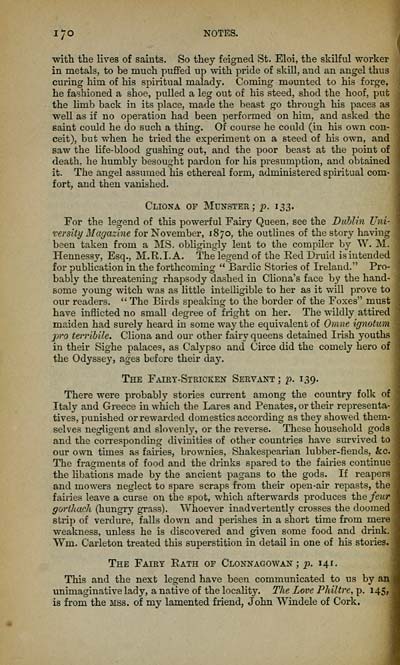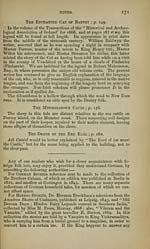Download files
Complete book:
Individual page:
Thumbnail gallery: Grid view | List view

170 NOTES.
with the lives of saints. So they feigned St. Eloi, the skilful worker
in metals, to be much puffed up with pride of skiU, and an angel thus
curing him of his spiritual malady. Coming mounted to his forge,
he fashioned a shoe, pulled a leg out of his steed, shod the hoof, put
the limb back in its place, made the beast go through his paces as
well as if no operation had been performed on him, and asked the
saint could he do such a thing. Of course he could (in his own con-
ceit), but when he tried the experiment on a steed of his own, and
saw the life-blood gushing out, and the poor beast at the point of
death, he humbly besought pardon for his presumption, and obtained
it. The angel assumed his ethereal form, administered spiritual com-
fort, and then vanished.
Cliona of Munster; p- "^ii-
For the legend of this powerful Fairy Queen, see the DMin Uni-
rersity Magazine for November, 1870, the outlines of the story having
been taken from a MS. obligingly lent to the compiler by W. M.
Hennessy, Esq., M.R.I. A. The legend of the Eed Druid is intended
for pubHcation in the forthcoming '* Bardic Stories of Ireland." Pro-
bably the threatening rhapsody dashed in Cliona's face by the hand-
some young witch was as little intelHgible to her as it will prove to
our readers. " The Birds speaking to the border of the Foxes" must ;
have inflicted no small degree of fright on her. The wildly attired '■
maiden had surely heard in some way the equivalent of Omne ignotum ■.
pro terrihile. Cliona and our other fairy queens detained Irish youths '
in their Sighe palaces, as Calypso and" Circe did the comely hero of ■
the Odyssey, ages before their day.
The F^viky-Stricken Servai^t ; lo. 139.
There were probably stories current among the country folk of
Italy and Greece in which the Lares and Penates, or their representa-
tives, punished or rewarded domestics according as they showed them-
selves negligent and slovenly, or the reverse. These household gods
and the corresponding divinities of other countries have survived to
our own times as fairies, brownies, Shakespearian lubber-fiends, &c.
The fragments of food and the drinks spared to the fairies continue
the libations made by the ancient pagans to the gods. If reapers
and mowers neglect to spare scraps from their open-air repasts, the
fairies leave a curse on the spot, which afterwards produces the feur
goriliacli (hungry grass). Whoever inadvertently crosses the doomed
strip of verdure, falls down and perishes in a short time from mere
weakness, unless he is discovered and given some food and drink.
Wm. Carleton treated this superstition in detail in one of his stories.
The Fairy Rath of Clonnagowan ; p. 141.
This and the next legend have been communicated to ns by an
unimaginative lady, a native of the locality. The Love Philtre, p. 145,
is from the 3iss. of my lamented friend, John Windele of Cork.
with the lives of saints. So they feigned St. Eloi, the skilful worker
in metals, to be much puffed up with pride of skiU, and an angel thus
curing him of his spiritual malady. Coming mounted to his forge,
he fashioned a shoe, pulled a leg out of his steed, shod the hoof, put
the limb back in its place, made the beast go through his paces as
well as if no operation had been performed on him, and asked the
saint could he do such a thing. Of course he could (in his own con-
ceit), but when he tried the experiment on a steed of his own, and
saw the life-blood gushing out, and the poor beast at the point of
death, he humbly besought pardon for his presumption, and obtained
it. The angel assumed his ethereal form, administered spiritual com-
fort, and then vanished.
Cliona of Munster; p- "^ii-
For the legend of this powerful Fairy Queen, see the DMin Uni-
rersity Magazine for November, 1870, the outlines of the story having
been taken from a MS. obligingly lent to the compiler by W. M.
Hennessy, Esq., M.R.I. A. The legend of the Eed Druid is intended
for pubHcation in the forthcoming '* Bardic Stories of Ireland." Pro-
bably the threatening rhapsody dashed in Cliona's face by the hand-
some young witch was as little intelHgible to her as it will prove to
our readers. " The Birds speaking to the border of the Foxes" must ;
have inflicted no small degree of fright on her. The wildly attired '■
maiden had surely heard in some way the equivalent of Omne ignotum ■.
pro terrihile. Cliona and our other fairy queens detained Irish youths '
in their Sighe palaces, as Calypso and" Circe did the comely hero of ■
the Odyssey, ages before their day.
The F^viky-Stricken Servai^t ; lo. 139.
There were probably stories current among the country folk of
Italy and Greece in which the Lares and Penates, or their representa-
tives, punished or rewarded domestics according as they showed them-
selves negligent and slovenly, or the reverse. These household gods
and the corresponding divinities of other countries have survived to
our own times as fairies, brownies, Shakespearian lubber-fiends, &c.
The fragments of food and the drinks spared to the fairies continue
the libations made by the ancient pagans to the gods. If reapers
and mowers neglect to spare scraps from their open-air repasts, the
fairies leave a curse on the spot, which afterwards produces the feur
goriliacli (hungry grass). Whoever inadvertently crosses the doomed
strip of verdure, falls down and perishes in a short time from mere
weakness, unless he is discovered and given some food and drink.
Wm. Carleton treated this superstition in detail in one of his stories.
The Fairy Rath of Clonnagowan ; p. 141.
This and the next legend have been communicated to ns by an
unimaginative lady, a native of the locality. The Love Philtre, p. 145,
is from the 3iss. of my lamented friend, John Windele of Cork.
Set display mode to: Large image | Transcription
Images and transcriptions on this page, including medium image downloads, may be used under the Creative Commons Attribution 4.0 International Licence unless otherwise stated. ![]()
| Early Gaelic Book Collections > J. F. Campbell Collection > Fireside stories of Ireland > (188) |
|---|
| Permanent URL | https://digital.nls.uk/79185316 |
|---|
| Description | Volumes from a collection of 610 books rich in Highland folklore, Ossianic literature and other Celtic subjects. Many of the books annotated by John Francis Campbell of Islay, who assembled the collection. |
|---|
| Description | Selected items from five 'Special and Named Printed Collections'. Includes books in Gaelic and other Celtic languages, works about the Gaels, their languages, literature, culture and history. |
|---|

